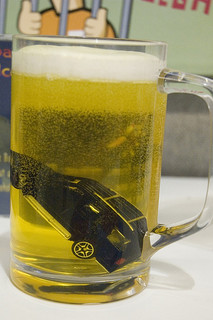It is hard to imagine that anyone old enough to drive has not heard that alcohol and driving are not a safe combination. The dangers of drunk driving are taught in school (even outside of driver’s education classes) and by parents, reiterated in numerous public service announcements, and tucked in countless other media messages. Still, there are many people who think the warning doesn’t apply to them. These people know that driving under the influence can be deadly, but still step behind the wheel believing that they can handle it. Most would never explicitly say they are immune to danger, they just act like it. Our San Francisco drunk driving accident lawyer knows how wrong they are and that this attitude puts both the individual and innocent bystanders at risk.
San Francisco Police Officer Accused of Causing Crash When Driving Drunk
Police officers often receive advanced driving instruction and one wonders if this extra experience led one California officer to decide he could handle driving despite being severely intoxicated. At his arraignment on Thursday morning, covered by The San Francisco Chronicle, Sergeant Thomas Haymond pleaded not guilty to charges stemming from the events of October 8. On that night, according to prosecutors, Haymond drove his personal vehicle into a parked car with enough force to push the parked vehicle into a tree. The incident occurred around 8:30 P.M. near the intersection of 12th Avenue and Lawton Street. Investigators believe that Haymond drove away from the scene to his Moraga Street home. Police arrested him approximately 30 minutes after the crash, having located him by following a trail of debris leading to his location.
Fifty-two year old Haymond is a 22 year veteran of the San Francisco Police, assigned to the department’s Central Station. He is facing misdemeanor hit-and-run and driving under the influence charges. Prosecutors at this week’s hearing said Haymond had a blood alcohol level of 0.28 at the time of the crash, more than three times the nationwide legal limit. Police spokesperson Officer Albie Esparza stated that Haymond is on paid leave pending investigation by the department’s internal affairs division. He will be placed in a paid administrative position when he returns to work.
The Increasing Effects of an Increasing BAC Level
 A chart provided by the Center for Disease Control details the effect alcohol has in both general terms and specifically on driving ability. Notably, judgment loss occurs at only 0.02%, well below the legal limit even though it can cause a drop in visual function and a decline in one’s ability to accomplish two tasks at once (essential to driving which requires a number of skills including the physical act of driving plus visual and audial observation). Coordination drops at 0.05%, as does ability to respond to emergency situations (i.e. steering around a prior collision). These are all still occurring before an individual is legally drunk. As the individual drinks more, concentration drops, the driver can’t maintain lane position, pay continued attention to the driving task, and generally loses the ability to control a vehicle. Physically the intoxicated person will find their memory impaired, reaction time drops with increased BAC, thinking slows, and eventually, concentration drops. Oftem, we don’t notice our own limitations, but these DO occur.
A chart provided by the Center for Disease Control details the effect alcohol has in both general terms and specifically on driving ability. Notably, judgment loss occurs at only 0.02%, well below the legal limit even though it can cause a drop in visual function and a decline in one’s ability to accomplish two tasks at once (essential to driving which requires a number of skills including the physical act of driving plus visual and audial observation). Coordination drops at 0.05%, as does ability to respond to emergency situations (i.e. steering around a prior collision). These are all still occurring before an individual is legally drunk. As the individual drinks more, concentration drops, the driver can’t maintain lane position, pay continued attention to the driving task, and generally loses the ability to control a vehicle. Physically the intoxicated person will find their memory impaired, reaction time drops with increased BAC, thinking slows, and eventually, concentration drops. Oftem, we don’t notice our own limitations, but these DO occur.
Helping Innocent Victims
No one is immune from the effects of alcohol, though some may be better at hiding those effects from themselves and those around them. Do not make the mistake of thinking you are an exception. If you are injured or lose a loved one because someone else thought they were somehow immune, don’t go it alone. Call our San Francisco car accident injury attorney. Together, we’ll fight for money damages that can help you recover and a verdict that will teach at least one person that the danger of mixing alcohol and driving applies to everyone, even them.
See Related Blog Posts:
Drunken Driving by the Numbers: a Sobering Set of Statistics
Why 21? Exploring the Drinking Age and Its Impact on Drunk Driving Crashes
 San Francisco Injury Lawyer Blog
San Francisco Injury Lawyer Blog

